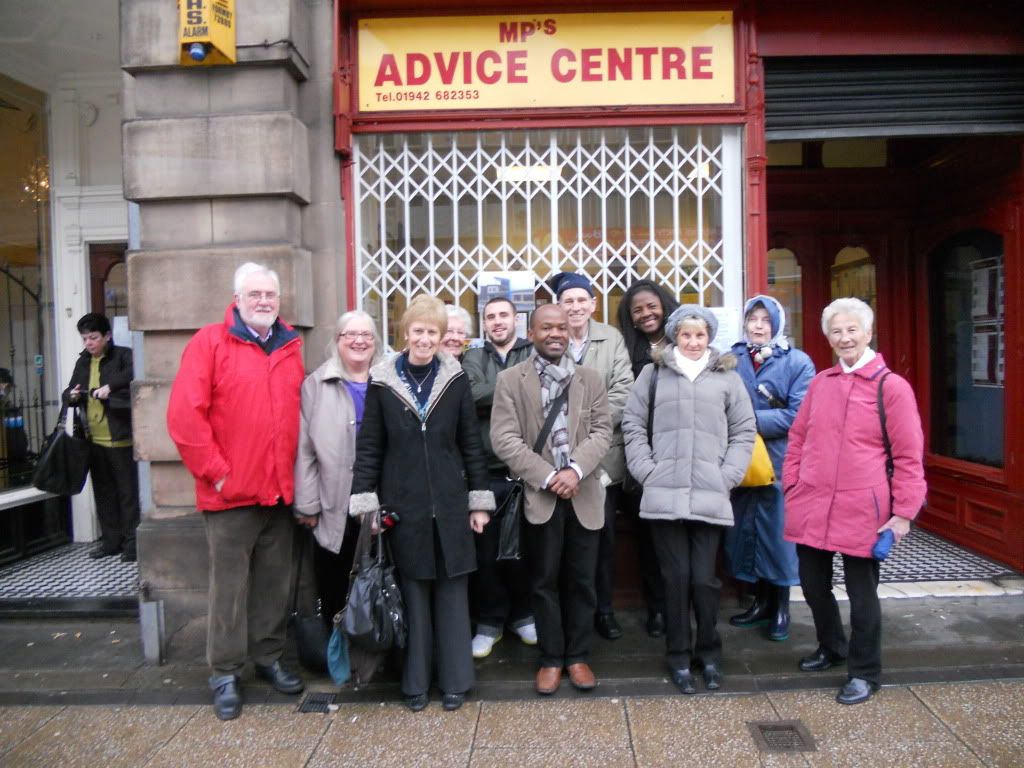Local journalist threatened with deportation
Article published: Tuesday, March 15th 2011
An exiled human rights activist and journalist is facing deportation to Sierra Leone after 12 years of living and working in the North West. James Fallah-William’s case has been described as one of “incompetence and ineffectiveness” on the part of the authorities, with the UK Borders Agency (UKBA) accused of lying to his local MP.

James and friends outside Leigh constituency office
Since his arrival in the UK in 1998 to attend university, James Fallah-Williams has been active as a campaigner and journalist, as well as helping establish a charity in Leigh which assists local people and migrants to find employment and voluntary placements. Yet despite being the model ‘Big Society’ citizen, the Home Office has rejected his asylum claim and threatened him with deportation.
James’ journey began in 1991, when as a sixth-form student he was forced to flee Sierra Leone after fighting spilled over from neighbouring Liberia. In 1995 British missionaries took him to The Gambia where they lived until 1997, when they helped him to fulfil his educational aspiration by securing a place for him at university in the UK.
After completing his undergraduate degree James returned to Sierra Leone for the first time in 10 years in 2001. His father’s political activism before the war and his position in their chieftain made return especially dangerous for James and after only one week he had to leave his parents once again. But this brief experience of his homeland would have a lasting impression; and on his return to the UK James launched himself into campaigning.
“People in Sierra Leone say they have an elected government but the level of incompetence, bad governance and corruption in the country is shocking,” James tells MULE.
During the 2007 elections in Sierra Leone he delivered a petition to Gordon Brown denouncing what was going on in the country.
“The key political parties had militias going round, beating people up and setting fire to homes,” explains James.
The absence of critical media in his home country convinced him of the need to fill the gap and bring these issues to the international stage.
“There are quite a lot of newspapers but they are politically affiliated, each one effectively the organ of its party. So you never find independent voices that talk about, for example, human rights abuses in the country… [No]body actually talks about the deep-seated corruption in the country. These were the key things we were highlighting.”
One target of his writing was presidential candidate Soloman Berewa and in articles published in Canada, the USA and UK, James and his colleagues called for the break-up of his party. Berewa was narrowly beaten at the polls and James believes their campaigning journalism played a part in influencing voters.
Immigration troubles
It was shortly after this that James’ immigration troubles began. Before his student visa expired in 2007 he was told he was eligible to apply for indefinite leave to remain (ILR) having been in the country for 10 years. While he had briefly returned to Gambia after his first stint in the UK, the period was deemed not broken as he had been forced from his native Sierra Leone as a refugee.
But despite being granted a further six months leave in order to pass the ‘Life in the UK’ test his claim for ILR was subsequently rejected. By this point it was clear James’ life would be in danger if he returned to Sierra Leone, having received a number of death threats in response to his articles, and so he made a claim for asylum in 2008. However, at an interview in Liverpool he was informed an error had been made in the previous process and that he should have been granted ILR and was told to return a week later.
“After a week I went back and the person dealing with my case told me that the boss was not there. In that time they phoned me back asking me to return at another time, but during that week [in November 2008] my housing was moved from Liverpool to Leigh.
“I didn’t apply again for ILR as my asylum case was still pending and it was not possible to have the two lodged at the same time.”
Challenging the system
James found himself in legal limbo until his asylum claim was rejected in November 2010. Yet the circumstances surrounding the delivery of the decision have raised suspicions. At the time James was in paid employment for Manchester Refugee Support Network (MRSN) where he worked as a caseworker.
One of his cases involved a family who, although receiving UKBA’s support for housing, was refused financial aid to buy food. The agency said they must spend their own money even though they had none and the situation was so grave the husband showed indications that he might hurt himself and his family. However with James’ assistance the husband successfully challenged UKBA at an Asylum Tribunal in October 2010 in what amounted to a test case – a resounding defeat for the agency which would be forced to provide for others in similar situations thereafter.
Dubious reasoning
Eight days after his client’s tribunal hearing James had his work permit revoked by the UKBA despite assurances made to his local MP Andy Burnham that this would not happen. The official stated reason was that he had “exhausted his appeals” – even though he had no idea that there were any pending, and despite the fact his asylum claim had not even been decided at the time. It also transpired that a letter summoning James to a meeting in Liverpool which led to the revoking of his work permit was written the same day as a separate letter to his client at MRSN – and to add to suspicions his own letter was not signed.
Nineteen days later James was told his asylum claim was definitively rejected and ‘certified’ – meaning he can only appeal the decision from outside the UK. He says this shows an error in process: “If they were going to take these decisions, they should have revoked my work permit and served me with the petition [of rejection] at the same time. Why did they have to wait nineteen days?”
Even more dubious is the reasoning on which his claim was rejected. According to UKBA James overstayed his student visa and spent 12 days in the UK illegally between 31 May and 12 June 2007. This is the time between the end of his student visa and the date he was given for a meeting to discuss his first claim for ILR.
“If that were the case, then why did they go on to extend my stay by six months to complete the ILR application?” asks James.
UKBA lies?

The UKBA have been accused of lying to MP Andy Burnham
James believes there is a connection between the help he provided to the client and UKBA’s decision on his own case. This is underscored by the agency’s deliberate misleading of James’ MP, confirmed to MULE by Andy Burnham’s office.
James says that he has since uncovered two further incidents of UKBA misinformation – a letter sent to Burnham in December 2010 stating James was not in the UK between 1998 and 2001, and a claim that he was granted an entry clearance in 2001. Neither of this he claims are true, but he has no doubts as to the motives: “This was done to cover-up what they have done, and to dissuade my MP from making further representations on my behalf.”
Yet the UKBA now appears to have changed its tune. Kath Grant, the Manchester Branch secretary of the National Union of Journalists (NUJ) of which James is a member, told MULE:”We are pleased that – after being confronted with evidence provided by James – the UK Border Agency has now admitted to Andy Burnham’s office that it was mistaken in its claim that James left the country for three years.In fact, he was studying here as he was able to prove.”
The Manchester NUJ branch are supporting James’ case. Kath Grant said:

Local human rights charity RAPAR are supporting James' campaign
“The UKBA now needs to go further. James belongs here, he has contributed an enormous amount to communities in Leigh and in Manchester and he must stay in the UK.”
When contacted by MULE the UKBA declined to reply.
Local human rights organisation RAPAR is now helping James build a campaign to stay in the UK. A spokesperson said: “If UKBA has refused James’ asylum case on the basis that he has lived here unlawfully for 12 days after living here lawfully for 12 years, why did it take three caseworkers more than two years (October 2008 to November 2010) to come to this conclusion?”
Michael Pooler
You can sign the petition for James to stay in the UK here
For information on James’ campaign you can contact Kath Grant on 07812 471 047
To find out about RAPAR visit their website here
More: Migration and asylum, News
Comments
-
[…] to “institutional vindictiveness” from the UKBA. He is demanding a proper review of his case, earlier reported on by Manchester Mule in March, and that the government answers questions put to it by […]
Pingback by Greater Manchester journalist on hunger strike — MULE on August 9, 2011 at 10:18 am -
[…] case has been dogged by controversy, with his original asylum claim having been refused just weeks after he aided a family in winning a […]
Pingback by Journalist ends hunger strike as UKBA backs down — MULE on August 19, 2011 at 7:11 pm
The comments are closed.





